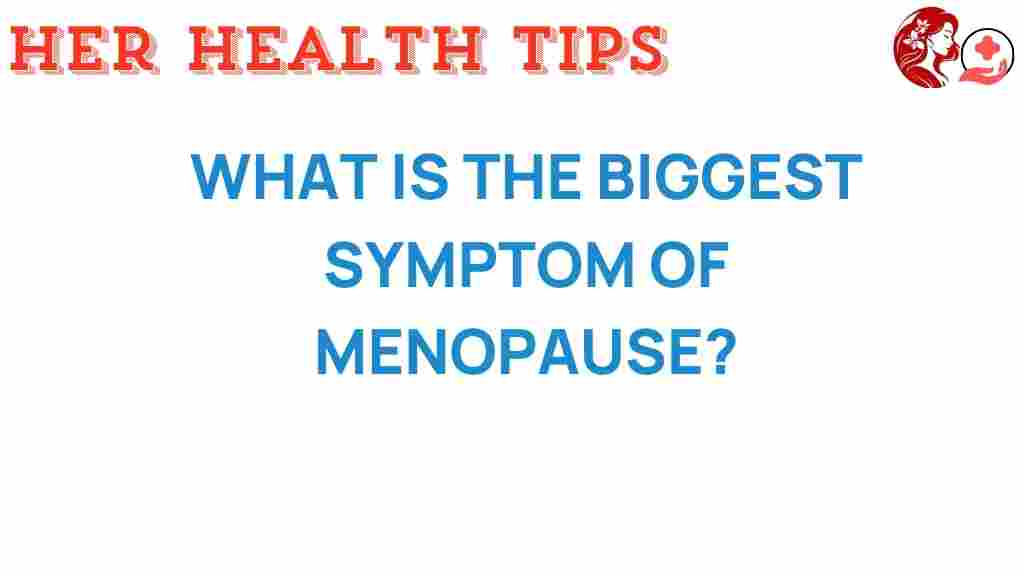Unraveling Menopause: What is Its Most Dominant Symptom?
Menopause is a significant phase in a woman’s life, marking the end of her reproductive years. This natural biological process is characterized by various symptoms resulting from hormonal changes that can affect women’s health in different ways. Understanding menopause, its symptoms, and available treatment options is crucial for women navigating this transition. In this article, we will explore the most dominant symptoms of menopause, particularly hot flashes, night sweats, and mood swings, while also addressing age-related changes and treatment options.
Understanding Menopause
Menopause typically occurs in women between the ages of 45 and 55, although the timing can vary. It is defined as the point when a woman has not had a menstrual period for 12 consecutive months. The transition leading up to menopause is known as perimenopause, during which women may experience a variety of symptoms due to fluctuating hormone levels.
During menopause, the ovaries gradually decrease production of hormones, particularly estrogen and progesterone. These hormonal changes can lead to a range of symptoms that vary in intensity and duration for each woman.
The Dominant Symptoms of Menopause
While there are many symptoms associated with menopause, some of the most notable include:
- Hot Flashes: Sudden feelings of heat that can cause sweating and discomfort.
- Night Sweats: Episodes of excessive sweating during sleep, often leading to disrupted rest.
- Mood Swings: Emotional fluctuations that can range from irritability to anxiety and depression.
Hot Flashes: The Most Recognized Symptom
Hot flashes are often the most recognized symptom of menopause. They can occur during the day or night and may last from a few seconds to several minutes. Hot flashes can be described as a sudden sensation of warmth that spreads over the body, often accompanied by sweating.
According to research, about 75% of women experience hot flashes during menopause. These can be triggered by various factors, including:
- Stress
- Spicy foods
- Caffeine
- Alcohol
- Heat and humidity
Night Sweats: The Disruptor of Sleep
Night sweats are another common symptom of menopause, characterized by excessive sweating during the night that can lead to sleep disturbances. Women may wake up drenched in sweat, causing discomfort and difficulty returning to sleep.
Night sweats can be particularly challenging as they can contribute to fatigue, irritability, and mood swings. Many women report that these episodes can lead to feelings of anxiety about going to bed, fearing another night of disrupted sleep.
Mood Swings: An Emotional Roller Coaster
Mood swings during menopause can be attributed to hormonal changes, but they can also be influenced by lifestyle factors such as stress, sleep patterns, and overall health. Women may experience:
- Increased irritability
- Feelings of sadness or depression
- Heightened anxiety
These emotional fluctuations can significantly impact a woman’s quality of life and relationships. It’s essential to address these mood changes proactively.
Age-Related Changes and Women’s Health
Menopause is not just about the cessation of periods; it also brings about various age-related changes that can affect women’s health. These changes include:
- Bone density loss, increasing the risk of osteoporosis.
- Changes in cardiovascular health, as estrogen plays a protective role.
- Weight gain, which is common during this transitional phase.
Women experiencing menopause should prioritize their health through regular check-ups and screenings. Staying active, maintaining a balanced diet, and managing stress can help mitigate some of these age-related changes.
Treatment Options for Menopausal Symptoms
There are various treatment options available to help manage the symptoms of menopause. These can be categorized into lifestyle changes and medical treatments.
Lifestyle Changes
- Diet: Incorporating a balanced diet rich in calcium and vitamin D can support bone health. Foods like fruits, vegetables, whole grains, and lean proteins can help manage weight and overall health.
- Exercise: Regular physical activity can alleviate symptoms such as mood swings and weight gain. Aim for at least 150 minutes of moderate exercise each week.
- Stress Management: Techniques like yoga, meditation, and deep-breathing exercises can help reduce stress and improve mood.
Medical Treatments
For women seeking more immediate relief from severe symptoms, medical treatments may be necessary. Options include:
- Hormone Replacement Therapy (HRT): HRT can effectively alleviate symptoms like hot flashes and night sweats by restoring hormone levels.
- Non-hormonal medications: Certain antidepressants and other medications can help reduce hot flashes and mood swings.
- Vaginal estrogen: For women experiencing vaginal dryness, localized estrogen treatments can be beneficial.
It’s essential to consult with a healthcare provider to discuss the best treatment options based on individual health needs and concerns.
Troubleshooting Common Symptoms
If you’re experiencing bothersome menopausal symptoms, consider these troubleshooting tips:
- Keep a symptom diary: Track your symptoms, their frequency, and triggers. This can help you and your healthcare provider identify patterns and effective treatments.
- Adjust your environment: Keep your living space cool, use breathable fabrics, and consider using a fan at night to help with hot flashes and night sweats.
- Practice good sleep hygiene: Create a relaxing bedtime routine, limit screen time before bed, and maintain a consistent sleep schedule to improve sleep quality.
Conclusion
Menopause is a natural transition in a woman’s life that can bring about a range of symptoms influenced by hormonal changes. While hot flashes, night sweats, and mood swings are among the most dominant symptoms, understanding and managing these changes is crucial for maintaining women’s health during this period. With various treatment options available, from lifestyle changes to medical interventions, women can find relief and navigate this phase of life with confidence.
For more information on menopause and women’s health, consider visiting this resource. And remember, always consult with a healthcare provider to discuss your symptoms and the best course of action tailored to your needs.
This article is in the category Reproductive and created by HerHealthTips Team
